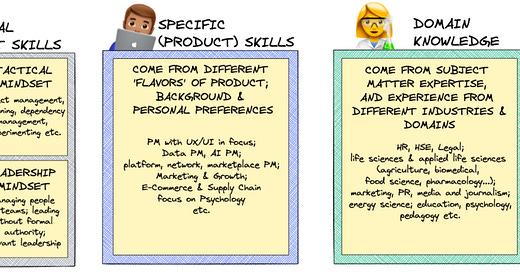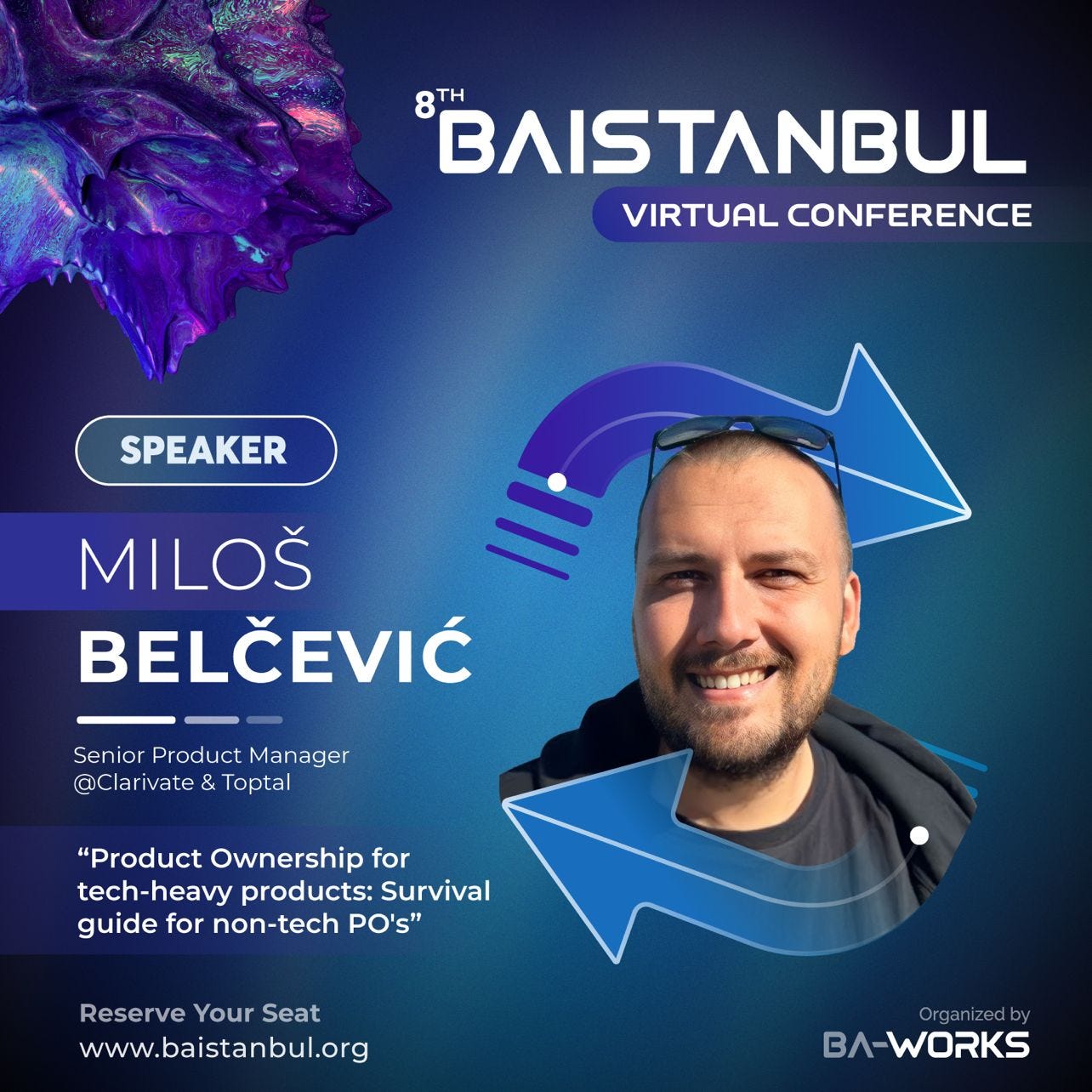Universal vs. specific (product) skills. And unlocking your super powers in 3 steps
What are universal product skills? What's role of specific skills and background? How does this relate to domain knowledge? What's most important? And how can we get the most of all this?
The “work to life” direction for enrichment is the whole point of Build Your Way – We talk about applying product thinking to your life.
However, another great thing happens as well:
Just like our work in product could improve our life if we applied some product thinking to it; the way we work gets better based on our outside-of-work experiences and learnings, if applied properly.
In terms of the “work to life” direction. we discussed in the previous post how to apply 80/20 principle to your life.
In terms of “life to work”, we will look into different types of knowledges and skills at play. And lastly, how to develop your own super powers in 3 steps.
Side-note: I will mostly use work in product as example, but I honestly think this is relevant for everyone, not only people working in product or product-adjacent fields.
🤫 psst! but there is a small surprise for product people, at the end of the newsletter.
Universal product skills; specific (product) skills; and domain knowledge
Recently, while preparing a conference talk , I ended up with a big part of it revolving around product skills vs. domain knowledge; what type of product skills exist, and what’s important etc. So it became a theoretical basis for this post.
The way I frame this1 :
To work in product, you need:
- universal product skills
- specific product skills
- domain knowledge
These 3 influence and enrich each other, and while they are all relevant and needed, but some may be more important than the others. (Also, note that you could remove “product”, and it will still be true for most of the knowledge work.)
Universal product skills
Universal product skills are transferable and can be applied across most of the products. Taking a step further, across jobs outside of product. Or even further, outside of work. Marty Cagan says2 "about 80% of the skills and talents of a product manager to be applicable across the different types of products".
I further organize these universal product skills into 4 groups. Note that the edges are fuzzy, and we could for instance argue if the whole "business mindset" sub-group actually falls under "strategic mindset".
1. Strategic mindset
All that lies on the 'strategical side'. Think: Analytical thinking, innovation, problem-solving, research, etc.
2. Tactical mindset
All that lies on the 'execution/tactical side'. Think: project management, planning for delivery/development, dependency management, experimenting, etc.
3. Business mindset
Think: growth, sustainability, profitability... creating value, capturing value; innovating business models, etc.
4. Leadership mindset
Revolving around leadership in two ways: people leadership (as in people management), or leadership through one’s individual work and expertise (as in individual contributorship).
Think: managing people & teams; leading without formal authority and servant leadership; sharing the vision, getting alignment, etc.
Specific (product) skills
Specific (product) skills are depending on previous experiences, expertise, knowledge, and background. They are also about working on different types of products in different ways. I like to say different "flavors of product management".
Think: product managers with a strong focus on design and UX/UI; product managers with platform, marketplace, or similar mindset; product managers with a focus on marketing, growth, and brand, etc.
Domain knowledge
Lastly, there’s domain knowledge. Product managers come from different roles and industries and it's a rare situation even nowadays that someone has been PM from the very start of their career. Many times, current PMs used to be subject matter experts or work in an industry their product is serving. For instance, medical doctors can work as product leaders (or start their own startups in healthtech); jurists or lawyers could end working on legaltech or IP products and so on.
For example, some of the interesting domains could be HR, HSE, Legal; life sciences & applied life sciences (agriculture, biomedical, pharmacology...); marketing, PR, media and journalism; education, psychology, pedagogy etc.
3 Steps to developing your own superpowers
This whole post was focused on product professionals, but I honestly believe that the core message is valuable for all of us. It may be especially true for product, but I think for any sort of knowledge work, we have these 3 basic statements that are true:
There’s a set of universal skills (or a mindset) – built over time, valuable and applicable across different contexts and jobs
There’s a set of special skills – based on one’s unique skills, and also background, perspective and experiences
There’s a set of domain knowledges – which is based on expertise, education, research and work in a certain domain
This is where the 4th piece of puzzle comes in play: there is curiosity, sharp mind and good learning skills. And with that, you can develop your super powers in 3 steps:
Maximalize the fruitful cross-pollination between universal skills, special skills and domain knowledge. In all directions.
Maximize the fruitful cross-pollination between your work life and life outside of work. In all directions.
Stay curious, sharp, and learn how to learn, and keep learning
P.S. Interested in learning to learn? Check out this blog post I wrote for Toptal: Learning to Learn: 5 Tips to Master Any Product Management Domain. It is geared towards product professionals, but techniques are unviersal, and I would especially recommend Feynman.
P.P.S. The conference I mentioned starts in ~20 ways. It’s BAistanbul.org, and I’m one of the speakers. It’s the 8th year for the conference, which is the first and only International Business Analysis Conference in Turkey & South East Europe. Hosted by BA-Works and endorsed by IIBA.
The small surprise for my readers:
In case you’re interested in product, business analysis, and emerging tech: you can use promo code 20%baistanbul to get 20% off
Product is a very wide field with many different, valid perspectives. There's a lack of standardization across the industry or even within organizations in terms of work titles and responsibilities; career paths are non-linear, and from my own anecdotal experience, it seems to be more product professionals with non-traditional backgrounds than traditional ones. As there’s no strong consensus on what a product manager does – no wonder there’s a variety of views on what product skills are or not.
M. Cagan, The Role of Domain Experience, Silicon Valley Product Group, 2025. Link: https://www.svpg.com/the-role-of-domain-experience/








